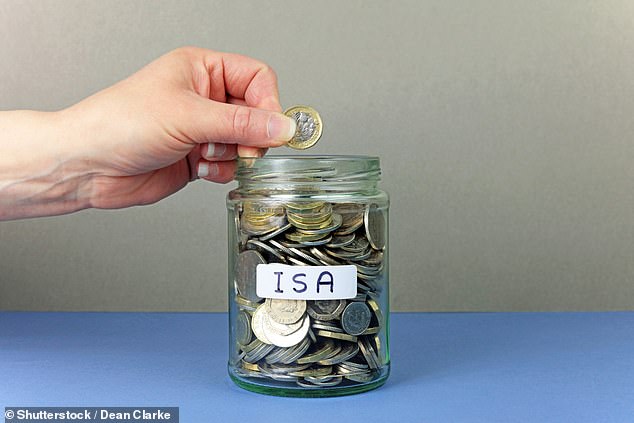I have £20,000 lump sum to save or invest, which is currently in a current account earning no interest.
I want to get it into an Isa to protect it from tax as soon as possible, but I am worried about markets falling.
How can I lower my risk and still protect it from tax?
The content below is not financial advice. Always do your own research and consider seeking independent financial advice before making any investment decisions.
This is Money replies: When saving money, one of your goals should be to increase your returns above the rate of inflation so that you aren’t losing out.
But more often than not current accounts pay little interest, if any at all. Meanwhile, big banks often offer savings rates that are uncompetitive, and many savers simply don’t realise.
This means that savers are seeing the value of their money gradually eroded as inflation races ahead of their bank’s interest rate.

If the money you have is surplus to your needs, and you can afford to let it grow over time, a stocks and shares Isa can be the perfect way to boost your returns
Combined with this, those with a large amount in the bank will see their funds hit further when they face tax charges on the interest they do earn.
But what can you do to make your money work for you?
Investing in stocks and shares is often put forward as the best way for your money to do more for you over the long term. Over recent decades, diversified investing returns have beaten cash holdings at almost every turn.
If the money you have is surplus to your needs, and you can afford to let it grow over time, a stocks and shares Isa can be a good way to boost your returns above the rate of inflation.
That being said, investing does come with risk and therefore isn’t suitable for everyone. With the announcement of Trump’s ‘liberation day’ tariffs, global markets plunged and saw trillions wiped from their value in days.
Many individuals don’t have funds that they can leave tied up for years, whether because they might need access to them sooner or they are saving for a specific purpose.
This is where investing instead in a cash Isa can be beneficial, allowing you to make the most of competitive interest rates from apps like Plum, as well as seeing the advantages of having your money in a tax-free wrapper.
This is Money spoke to an expert from Plum, to find out where your money might be best placed.
Keep in mind, as with all investing, capital is at risk, meaning the value of investments can go down as well as up and you may get back less than you invest. Past performance is not a reliable indicator of future results.

Are you comfortable with risk? Volatility is a natural part of investing, it’s impossible to avoid it altogether and it’s common for markets to go through difficult periods
Investing: The pros and cons
Plum replies: While on the face of it your money isn’t losing value remaining in a zero-interest account, the purchasing power of your cash actually is reducing due to inflation.
As the cost of goods and services rise, your money doesn’t go as far – so it’s important for your savings to be earning a return that at least matches the rate of inflation and doesn’t lose value in real terms.
If you’re not going to need to access your money over the long-term, at least five years, you may want to consider investing.
While riskier, investing in the stock market can offer an opportunity to grow your wealth and it’s typically been the best long-term option to help avoid inflation eroding the value of your money. However, past performance is not a reliable indicator of future results.
If you have a pension, you can see first-hand how your contributions have been growing as they’re most likely already invested in the stock market.
I understand the concern about markets falling. It’s a particularly volatile time right now following the announcement of these extraordinary tariffs by President Trump, and many people will be sitting on the sidelines to see how it plays out.
Seeing the market performance metrics showing red can cause distress and be off-putting, and this is an understandable human reaction.
However, volatility is a natural part of investing. It’s impossible to avoid it altogether, and it’s common for markets to go through difficult periods.
The key thing is that on a historical basis, the longer you invest for, the less likely you are to see losses. That’s because economic growth is a long-term trend. And when markets fall like recently, your money will buy more shares or fund units as they’ve become cheaper.
You don’t have to invest all your money in one go, money can be drip-fed regularly into the markets through ‘pound-cost averaging’, which means you can smooth out some of the bumps with your investments and don’t miss out on the recovery if it comes.
Apps such as Plum (available to download on App Store or Google Play) can automate this process and invest small amounts in your chosen fund for you each week.

Stashing the cash: An alternative type of Isa is a cash Isa, where you can put your money to work by earning interest
Which Isa is right for you?
Whatever method you decide to try to grow your money, it’s important to ensure you’re using the right product for your tax circumstances.
For example, depending on your earnings, you may have to pay tax on the interest you earn from a typical savings account.
There are other options, though. Isas allow you to earn returns without having to pay income, capital gains or dividend tax. You have an allowance of £20,000 per tax year that you can spread across different types of Isa.
For example, stocks and shares Isas allow you to invest your money in funds, bonds and shares.
Of course, investing also means your money can go down as well as up.
While there is potential to make more money via a stocks and shares Isa than a savings account – we found that the average value of the top 25 stocks and shares Isas stands at £8.8million, versus an average of £650,000 for the largest 25 cash Isas* – it might not be right for you if you can’t afford to take the risk, or would prefer not to.
An alternative type of Isa is a cash Isa, where you can put your cash savings to work by earning interest, without paying tax on it.
Unlike investing, there is no market risk and you know what returns you’ll be getting, although you effectively put a cap on how much money you make.
Check to see if the money is FSCS protected so you know that you get your money back if the worst was to happen to the financial institution that you deposited with.
There are some very competitive cash Isa deals out there right now offering interest rates that are above the Bank of England base rate, and the rate of inflation.
But be aware that the direction of the base rate is expected to be downwards, so you may need to review whether you’re getting enough value if the rate does indeed fall unless you decide to go for a fixed rate option.
You can spread your allowance across different types of Isa, so you don’t have to pick one or the other.
For example, you could hold some of the money in a cash Isa while interest rates remain relatively high, and the rest in a stocks and shares Isa.
You can transfer money between them, but before you do this, check with both the provider you’re transferring from and the provider you’re transferring to for any fees or specific processes they may have, as well as checking if the Isas are flexible so you don’t affect your current year’s Isa allowance.
Before investing, it’s a good idea to have a separate, easy-access savings account for any money you might need quick access to, for example an emergency fund or savings for a specific short term purpose like a holiday, so you could put some money in an easy-access cash Isa for that purpose.
It’s also wise to make sure you’ve paid off your short-term debts before you invest.
Find out more at withplum.com
Tax treatment depends on your individual circumstances and may change in the future.
*HMRC
Some links in this article may be affiliate links. If you click on them we may earn a small commission. That helps us fund This Is Money, and keep it free to use. We do not write articles to promote products. We do not allow any commercial relationship to affect our editorial independence.




